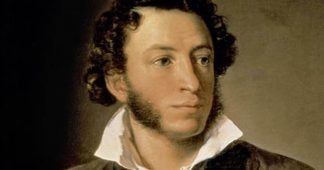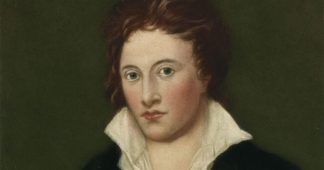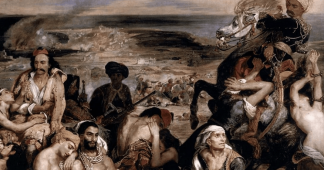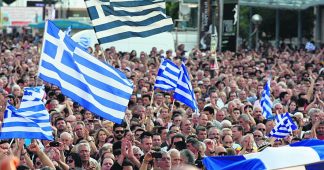Tasos Kokkinidis
The 1821 Greek War of Independence erupted into the world of the early nineteenth century as Europe was being shaken to its roots by riots in many nations which threatened its monarchies.
The Greek Revolution was a cause for concern for the elites, since it threatened Europe’s social and political balance. However, it was greeted with enthusiasm by many ordinary people across Europe and the US, which is undoubtedly partly to do with the Greek origin of so much of the West’s classical heritage.
The uprising quickly become a cause célèbre in the Western world, giving rise to an impressive wave of what came to be known as “philhellenism,” or the love of Greece and its history.
Some wealthy Americans and western European aristocrats, such as the renowned poet Lord Byron and later the physician Samuel Howe, actually took up arms and joined the Greek revolutionaries in the Greek War of Independence.
“We are all Greeks” Philhellenes join the fight in the Greek War of Independence
Percy Bysshe Shelley, one of the major English Romantic poets, perfectly captured the overall mood in his poem “Hellas.” “We are all Greeks. Our laws, our literature, our religion [sic], our art have their roots in Greece. But for Greece … we might still have been savages and idolators.… The Modern Greek is the descendant of those glorious beings.”
The Ottoman massacres of Greeks at Chios in 1822 inspired Eugène Delacroix’s famous painting “Massacre of Chios;” other philhellenic works by Delacroix were inspired by a number of Lord Byron’s poems. Byron, the most celebrated philhellene of all, gave his name, his prestige, his wealth — and ultimately his life — to the cause.
In the summer of 1821, large numbers of young men from all over Europe began to gather in the French port of Marseilles to book passage to Greece and join the Greek War of Independence.
The French philhellene Jean-François-Maxime Raybaud wrote when he heard of the Revolution, in March of 1821, “I learnt with a thrill that Greece was shaking off her chains.” By July of that year, he had boarded a ship bound for Greece.
Between the summer of 1821 and the end of 1822, when the French began to inspect ships leaving Marseilles for philhellenes and record their numbers, some 360 volunteers had made their way to Greece.
In Germany, Italy and France, many clergymen and university professors gave speeches acknowledging that all of Europe owed a huge debt to ancient Greece.
A young medical student in Mannheim wrote that hearing his professor lecture on the need for Greek freedom went through him like an electric shock, inspiring him to drop his studies and head to Greece. At the same time, a Danish student wrote: “How could a man inclined to fight for freedom and justice find a better place than next to the oppressed Greeks?”
From the United States came the doctor Samuel Gridley Howe and the soldier George Jarvis to fight alongside the Greek people in the Greek War of Independence.
Philhellenes in the US
The classicist Edward Everett, a professor of Greek at Harvard, was active in championing the Greek cause in the United States.
In November of 1821, he published an appeal from Adhamantios Korais, which read “To the Citizens of the United States, it is your land that Liberty has fixed her abode, so you will not assuredly imitate the culpable indifference or rather the long ingratitude of the Europeans.”
Korais went on to call for direct American intervention in the armed struggle in several American newspapers.
In 1821, the “Greek Committee” in Charleston, South Carolina sent the Greek people 50 barrels of salted meat, while the Greek Committee in Springfield, Massachusetts sent supplies of salted meat, sugar, fish and flour. In New York City, a charity ball hosted by that city’s Greek Committee raised the then-princely sum of $8,000.
In Nafplio, the first capital of modern Greece, a monument to honor the philhellenes who died fighting in the war listed 274 names, with one hundred from Germany, forty each from France and Italy, and the rest from Britain, Spain, Hungary, Sweden, Portugal and Denmark.
Lord Byron fought for the cause of Greek freedom
But of course the biggest casualty of the war among all the philhellenes of the world was that of Lord Byron, who is celebrated in Greece as a national hero.
He raised money for the Greek War of Independence by selling his English estate, which raised some £11,250 pounds sterling, all of which he planned to spend on the Greek cause. In today’s money, Byron would have been a millionaire many times over, and the news that a fabulously wealthy British aristocrat known for his generosity had arrived in Greece made Byron the object of much solicitation in a desperately poor country like Greece.
He joined forces with Greek rebel leaders fighting the Ottomans in the Greek War of Independence near Missolonghi. In 1824 he planned to attack the Turkish-held fortress of Lepanto, at the mouth of the Gulf of Corinth, despite his lack of military experience.
However, before the expedition could sail, on February 15, 1824, the warrior poet fell ill and died in Missolonghi on April 19.
Close to the center of Athens, outside the National Garden, is a statue depicting Greece in the form of a woman crowning Lord Byron.
The statue is by the French sculptors Henri-Michel Chapu and Alexandre Falguière. Since 2008, the anniversary of Byron’s death, April 19th, has been honored throughout the nation of Greece as “Byron Day.”
Published at greekreporter.com










